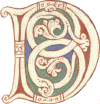Vnde Vrbanus in cap. Sancti Ruffi SG Vnde Vrbanus papa abbati Sancti Rufi A
 ue sunt, inquit, leges, una publica, altera
privata. Publica lex est que a sanctis patribus scriptis est confirmata, ut
est lex canonum.
ue sunt, inquit, leges, una publica, altera
privata. Publica lex est que a sanctis patribus scriptis est confirmata, ut
est lex canonum.
Lex uero priuata est que instinctu sancti spiritus in corde scribitur. Si quis qui priuata ducitur spiritu sancto afflatus, proprium quod sub episcopo retinet dimittere et in monasterio se saluare uoluerit, quoniam
priuata ducitur, publica lege non tenetur. Dignior est enim priuata lex quam publica. Quisquis ergo hac lege ducitur etiam episcopo suo contradicente erit liber nostra auctoritate.Titus Lenherr, "Zur Überlieferung des Kapitels "Duae sunt," AKKR 168 (1999) 369-374.
Argumenti per considerando che "Duae sunt" di Graziano I é il testo originario e autentico di Urbano II
There are, he said, two laws, one public, the other private. The public law is that which is established in writing by the holy fathers, as is canon law.
If anyone who holds his own property under his bishop is inspired by the Holy Spirit wishes to seek his salvation in a monastery, because he is led by private law he is not held public law.
For private law is more worthy than public law. Whoever, therefore, is led by this law will be free, even if his bishop had forbidden <his entering a monastery>.
